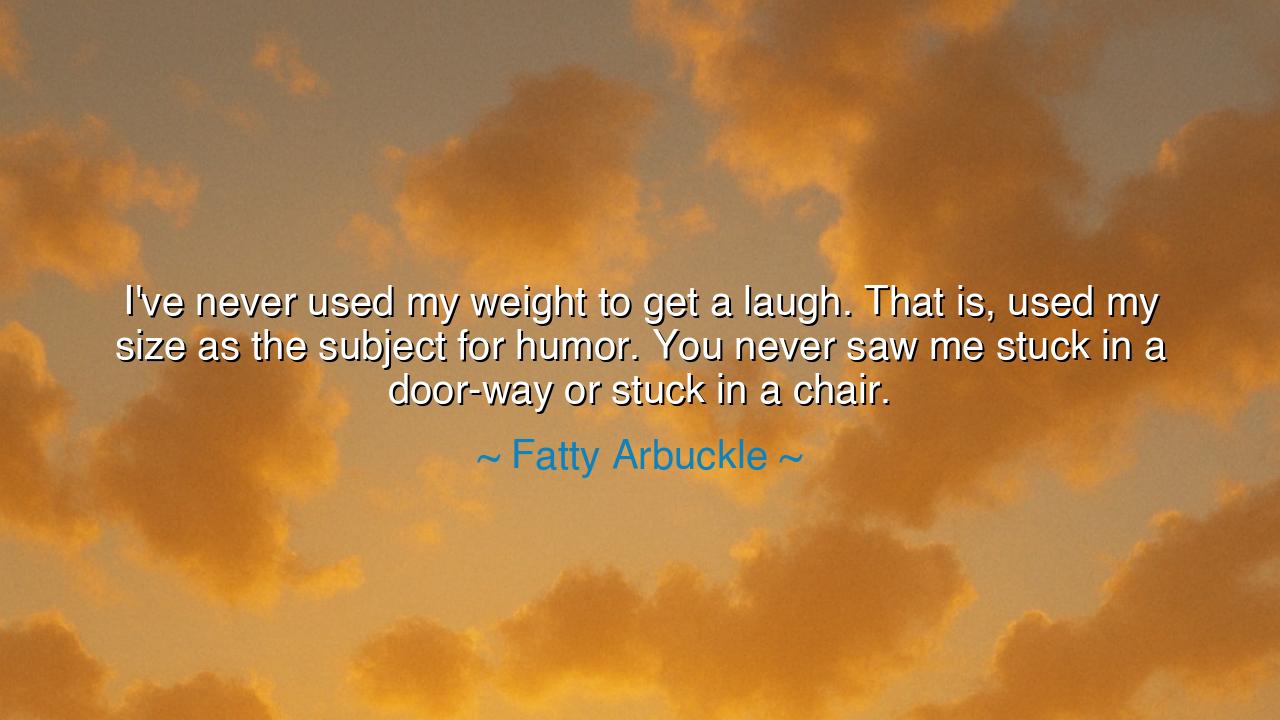
I've never used my weight to get a laugh. That is, used my size
I've never used my weight to get a laugh. That is, used my size as the subject for humor. You never saw me stuck in a door-way or stuck in a chair.






In the reflective and defiant words of Fatty Arbuckle, one of the first great stars of silent comedy, we hear not merely the voice of an entertainer, but the cry of a man who understood dignity amidst laughter: “I’ve never used my weight to get a laugh. That is, used my size as the subject for humor. You never saw me stuck in a doorway or stuck in a chair.” Beneath these words lies a philosophy both noble and enduring—the belief that humor should elevate the human spirit, not demean it; that laughter born of intelligence is a flame, while laughter born of mockery is smoke that blinds the heart. Arbuckle’s declaration is not just about comedy—it is about self-respect, the courage to define oneself by one’s art, not by one’s appearance.
In the golden dawn of cinema, when black and white film flickered like living dreams, Roscoe “Fatty” Arbuckle stood as a giant, not merely in form but in talent. Yet even then, the temptation of easy laughter was strong. Many comedians of his time relied on physical ridicule, turning flaws into spectacles—stumbling over their bodies, falling into barrels, being mocked for what they could not change. Arbuckle refused this path. Though the world labeled him “Fatty,” he never allowed that name to become his joke. He transformed comedy into grace—movement instead of mockery, wit instead of humiliation. His humor was clever, his timing precise, his spirit radiant. In an age when laughter often came at the expense of others, he proved that one could make the world laugh while still standing tall.
This choice speaks to a timeless truth: that dignity and laughter need not be enemies. The ancients, too, revered those who could laugh without cruelty. The philosopher Plato warned that laughter must spring from joy, not from contempt. The fool who mocks himself to please others sells his soul for applause; the wise comedian, like Arbuckle, gives laughter as a gift, not as a shield. There is bravery in refusing to make one’s pain the punchline, and nobility in showing the world that humor can honor the self rather than diminish it.
Consider the story of Cyrano de Bergerac, the poet-warrior with the great nose. He was mocked for his appearance, yet he refused to beg for pity or cheap amusement. Instead, he wielded his words like a sword, crafting beauty from what others scorned. He, too, could have turned his misfortune into jest, but he chose the higher path—to show that true art draws laughter from wit, not weakness. So it was with Arbuckle, who carried his size not as burden, but as part of his being, without shame, without self-ridicule. Both men stood as monuments to self-mastery—those who could command laughter without surrendering self-worth.
Yet Arbuckle’s quote carries another kind of heroism—a quiet rebellion against a world that seeks to define people by what they appear to be, not by what they create. To say “I never used my weight to get a laugh” is to say “I refused to be reduced.” In an industry that often demanded that performers humiliate themselves for fame, Arbuckle held fast to his integrity. His humor moved like poetry—gentle, surprising, and filled with human warmth. He laughed with the audience, not at himself, and in doing so, he invited them to see comedy as art, not cruelty. He made laughter noble.
In our modern age, when the temptation to exploit one’s flaws for attention has only grown stronger, Arbuckle’s words are a beacon. They remind us that self-respect is the root of true expression. To demean oneself for laughter or approval is to trade authenticity for fleeting applause. But to bring joy from one’s talents, to make others smile while remaining whole—this is mastery. The ancient poets would have called it balance, the harmony between the inner and outer worlds, where humor uplifts without harm.
So, let this be the lesson for all who seek laughter and art: Never make yourself small to be seen. Do not trade dignity for attention, nor mock your own being for the comfort of others. Create with pride, laugh with grace, and let your gifts—not your insecurities—be your offering to the world. For laughter born of cruelty fades quickly, but laughter born of truth endures like a flame against the night.
And remember, as Fatty Arbuckle once showed in his silent yet eloquent way: the greatest comedians are not those who fall down for applause, but those who stand tall and make the world rise with them.






AAdministratorAdministrator
Welcome, honored guests. Please leave a comment, we will respond soon